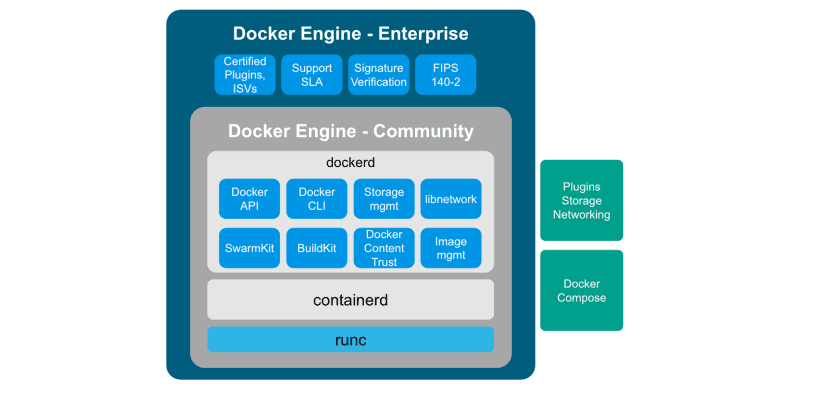
Docker is an open source project that automates the deployment of applications within software containers, providing an additional layer of application virtualization abstraction and automation across multiple operating systems.
Docker uses resource isolation features of the Linux kernel, such as cgroups and namespaces to allow independent "containers".
In this way, Docker provides that these containers run within a single Linux instance, avoiding the overhead of starting and maintaining virtual machines.
Linux kernel support for namespaces isolates an application's view of its operating environment.
Including process trees, network, user IDs, and mounted file systems, while kernel cgroups provide resource isolation, including CPU, memory, block I / O, and network.
New version of Docker 18.09
A version of the Docker Isolated Linux Container Management Toolkit 18.09 is presented, which provides a high-level API for manipulating containers at the isolation level of individual applications.
Docker allows you to launch arbitrary processes in isolation mode and then transfer and clone containers created for these processes to other servers, taking all the work out of creating, maintaining, and maintaining the containers.
As of Docker 18.09, the release support time has benefited as developers have increased from 4 to 7 months due to the modernization of the development cycle of Docker Community Edition.
Another of the strong points to highlight of this new Docker release is that the basic runtime for container management has been updated to the containererd 1.2 release.
This stabilized the use of the gRPC container management mechanism and ensured compatibility with the Kubernetes 1.12 platform and improved support for universal images for different architectures (multi-arch).
On the other hand, in Docker 18.09 the possibility of a new build backend has been expanded (provides the functionality of the "docker build" command). To automatically perform garbage collection operations that are supported by nested job launches and do not require root user authority during the operation.
BuildKit improvements

Docker 18.09 also includes the option to defer the BuildKit. This is a new build architecture that improves performance, storage management, and extensibility, while adding some important new features.
Performance improvements: BuildKit includes a redesigned concurrency and caching model that makes it much faster, more accurate, and more portable.
With this change and alignment of architecture, also Docker developers now allow an upgrade from the Community version engine to the Enterprise engine with a simple license activation.
For current users of the Docker Community version, this move means unlocking many enterprise security features and gaining access to Docker's enterprise-class support and extended maintenance policies.
Compared to the previous version
The code was modified to organize the parallel execution of the job and the caching model was changed, which made it possible to significantly speed up the assembly.
For example, when testing the Dockerfile project Moby set speed increased from 2 to 9,5 times due to the simultaneous execution of multiple mounting stages, ignoring unused steps and incremental data files between sets in view context.
Added the ability to embed secrets in the Dockerfile and safely transfer them during the build process, without storing them in the resulting images and without being installed in the build cache.
The ability to forward ssh ssh-agent sockets, is implemented, for example, to connect to private repositories using an existing connection through the ssh-agent.
Now assembly cache can be managed, separately from images.
Added new command "docker builder prune" to clear cache and the ability to define cleanup rules and more.
If you want to know a little more about it you can visit the following link.